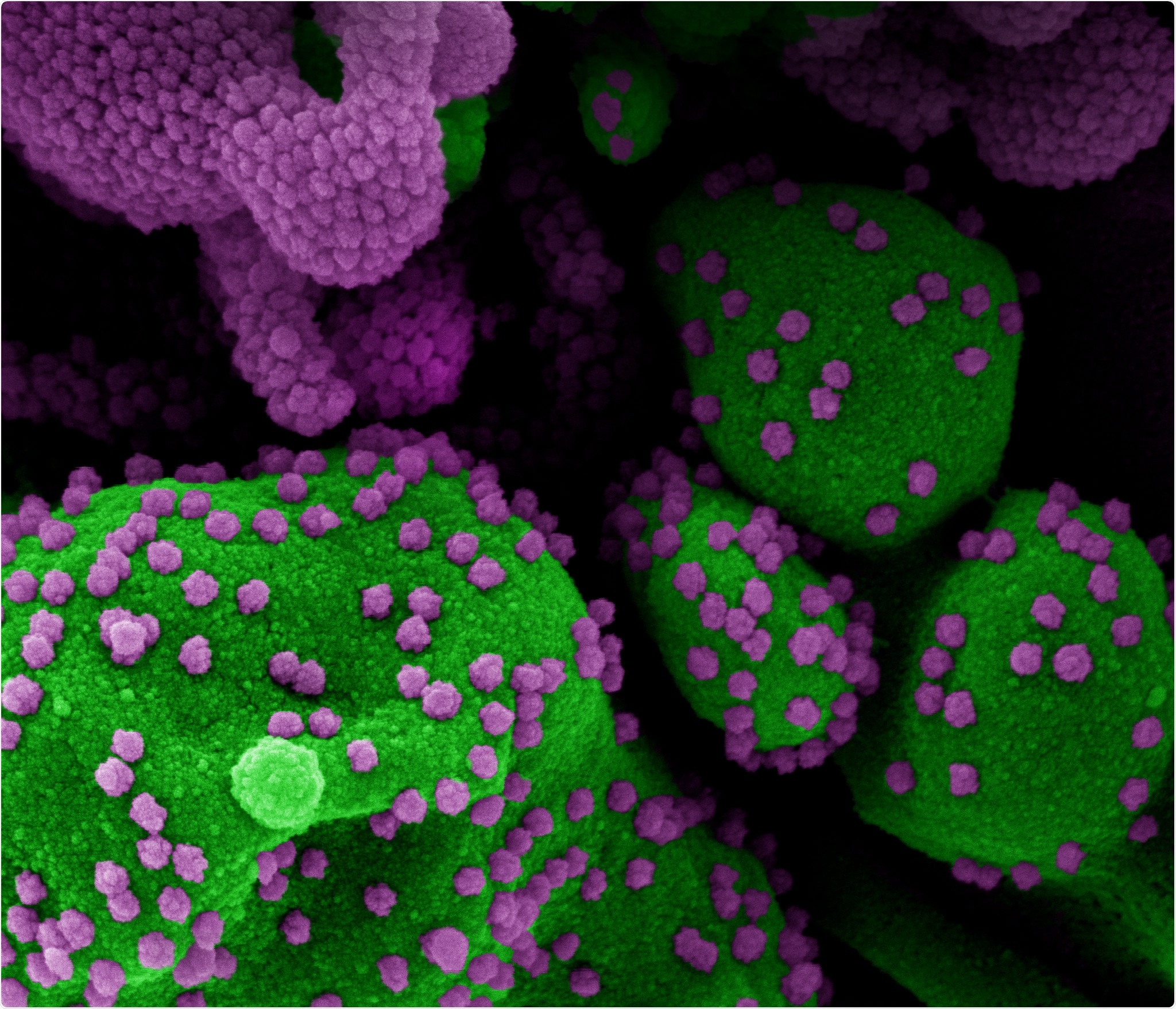Amidst the COVID-19 pandemic, which is a potentially fatal respiratory disease caused by severe acute respiratory syndrome coronavirus 2 (SARS-CoV-2), the data on various complications caused by this virus are still emerging and evolving in real-time.

Novel Coronavirus SARS-CoV-2 Colorized scanning electron micrograph of an apoptotic cell (green) heavily infected with SARS-COV-2 virus particles (purple), isolated from a patient sample. Image at the NIAID Integrated Research Facility (IRF) in Fort Detrick, Maryland. Credit: NIAID
One of the potential complications is deep vein thrombosis, which is a condition that occurs after a blood clot forms in a large vein, most often in the calf. Pain, swelling, and sometimes pulmonary embolism (or a sudden blockage in the lung) can occur, making deep vein thrombosis a life-threatening condition.
Several studies to date have shown a high incidence of venous thromboembolic complications in patients with severe and critical COVID-19; however, the data on moderate to severe (but not critical) illness is lacking.
This is why researchers from the Federal State Clinical Research Hospital and Burnasyan Federal Medical Biophysical Center of Federal Medical Biological Agency in Russia aimed to investigate the incidence of deep-vein thrombosis in patients with moderate to severe COVID-19, but also to assess its prevalence by using imaging methods, clinical information, and laboratory data.
Inclusion and exclusion criteria
This study explored 75 consecutive patients during the first half of May 2020 with moderate to severe COVID-19. All of them underwent venous ultrasonography within seven days following hospital admission, which is the standard imaging test used in patients suspected of having acute deep venous thrombosis.
Critical COVID-19 patients admitted to the intensive care unit, patients with a known history of deep vein thrombosis, patients with more than 75% lung damage, as well as patients with recent hip or leg trauma were excluded from the analysis.
High prevalence of deep vein thrombosis in COVID-19 patients
Detailed vein ultrasonography has revealed spontaneous echo contrast in common femoral veins in 71% of patients, which indicated a decreased venous flow velocity and blood stasis. Furthermore, vein thrombosis was found in 16 patients; one of them had superficial thrombosis, while 15 patients developed deep vein thrombosis.
Most of the patients had thrombi only in calf veins, while two patients presented with ileofemoral thrombosis and floating thrombi with an increased risk of pulmonary embolism. Most of the thrombi were occlusive and situated in the peroneal veins, posterior tibial veins, and sinuses.
"Patients with deep vein thrombosis were somewhat older than those without thrombi, and they had a longer time between symptoms onset and admission to hospital," explain study authors. "However, those differences were not significant," they add.
Despite intensive anticoagulant therapy with low molecular weight heparins, results were limited, and basically, all thrombi persisted. The aforementioned ileofemoral thrombosis in two of the patients carried a high risk of pulmonary embolism, but early detection helped in averting that dire scenario.
Additionally, two patients with deep vein thrombosis presented with thrombi in veins of the upper extremities, which underscores the possibility of extensive thrombi formations in patients with even moderate COVID-19.
Treatment implications
Based on the results of this study, we can appreciate the recommendations of the American Society of Hematology to monitor platelet count, partial thromboplastin time, activated partial thromboplastin time, fibrinogen and D-dimer in all patients with COVID-19. But should we wait for the results before administering treatment?
"Perhaps it is advisable to start anticoagulation therapy as early as possible in patients with moderate to severe COVID-19 and continue it after discharge from hospital", caution study authors based on their results.
Moreover, it perhaps makes sense to additionally follow these patients even after recovery and, at some point in the future, perform venous ultrasonography in order to rule out deep vein thrombosis.
Going forward, physicians around the world will have to consider appropriate prevention of deep vein thrombosis in patients with moderate to severe COVID-19 by ordering screening tests for early detection and making proper referrals for patients that necessitate prophylactic treatment.

 This news article was a review of a preliminary scientific report that had not undergone peer-review at the time of publication. Since its initial publication, the scientific report has now been peer reviewed and accepted for publication in a Scientific Journal. Links to the preliminary and peer-reviewed reports are available in the Sources section at the bottom of this article. View Sources
This news article was a review of a preliminary scientific report that had not undergone peer-review at the time of publication. Since its initial publication, the scientific report has now been peer reviewed and accepted for publication in a Scientific Journal. Links to the preliminary and peer-reviewed reports are available in the Sources section at the bottom of this article. View Sources
Source:
Journal references:
- Preliminary scientific report.
Kerbikov, O.B., Orekhov, P.Y., Borskaya, E.N. & Nosenko, N.S. (2020). High Incidence of Venous Thrombosis in Patients with Moderate to Severe COVID-19. medRxiv. https://doi.org/10.1101/2020.06.12.20129536.
- Peer reviewed and published scientific report.
Kerbikov, Oleg, Pavel Orekhov, Ekaterina Borskaya, and Natalia Nosenko. 2021. “High Incidence of Venous Thrombosis in Patients with Moderate-To-Severe COVID-19.” International Journal of Hematology 113 (3): 344–47. https://doi.org/10.1007/s12185-020-03061-y. https://link.springer.com/article/10.1007/s12185-020-03061-y.